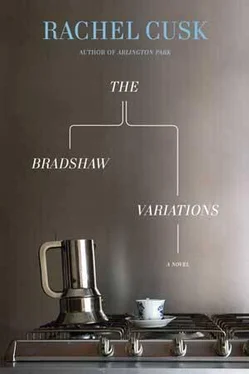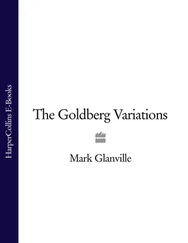‘That adagio is just divine — I had no idea you’d got so important! I had my ear to the door, thinking who can that possibly be in there?’
‘I can’t play the other movements,’ Thomas says apologetically, though his face is red with pleasure. Ignatius is a real pianist, not a teacher but a performer, whose name can be seen on flyers for lunchtime recitals at the Wigmore Hall. He is ashamed of his disloyalty to Benjamin: vaguely he understands that it is their intimacy that causes him to feel ashamed. Usually, only Tonie can constrain him in this way, web him finely with the knowledge of herself, so that he feels clumsy, tearing the gossamer threads.
‘Well, it’s hardly surprising,’ Benjamin says. His voice is a little terse. ‘It’s only been a few months.’
Thomas turns the pages with their ferocious black peaks and chasms of semiquavers, their turbulent, chord-filled bass clefs. He doesn’t fully understand why he can’t play them. He has learned the adagio , yet the allegro molto e con brio and the grave remain as encrypted to his eyes as ancient Greek. Ignatius looks over his shoulder at the music.
‘Lord, who can?’ he says, sotto voce, as though this heresy were in danger of being overheard by the Bengali family who live upstairs and complain constantly to the Environmental Health department about the intolerable levels of noise in the basement. ‘I say go for the big tunes, the big sensations, the highs. I just live for it — I live for that adagio ! I’m all over gooseflesh.’ He holds out his thick forearm. ‘Am I flushing?’ he asks Benjamin.
‘Slightly,’ Benjamin says stiffly. ‘Your neck looks a bit red.’
Ignatius tugs at his collar, feeling around his neck. ‘I have a weak skin,’ he says. ‘I am a litmus paper of emotion. Once it gets a hold, it’s all over me. Rashing, blotches, hives — I can feel it spreading insidiously all through those defenceless cells and corpuscles. My mother used to say it was God’s way of making sure I never told a lie.’
‘When it was quite obviously a vitamin deficiency,’ Benjamin says, apparently in spite of himself.
Ignatius tuts. ‘Admittedly I am one hundred per cent trailer trash,’ he says, to Thomas. ‘In our house, the Pop-Tart was considered a health food. That darling faux-fruit centre — it makes my teeth ache just thinking about it.’
‘It ought to be regarded as a form of cruelty,’ Benjamin says. He stands and repositions his chair beside Thomas at the piano. Ignatius looks at him with fond vexation.
‘Benjamin’s just marbled with vitamins. Look at that hair!’
Benjamin blushes, touching his glossy dark hair. ‘We ate a normal balanced diet, that’s all. Just normal English food.’
‘Shepherd’s pie,’ Ignatius says dreamily. ‘I adore your mother’s shepherd’s pie. I would have followed her around all day like a puppy, hoping she’d drop some of that pie in my mouth. Or one of those tiny potatoes, all crunchy with goose fat.’
‘It wasn’t perfect, you know,’ Benjamin says. ‘There are other things children need besides food. I’m simply saying that it was normal.’
Thomas feels the current of the men’s relationship flowing treacherously around him. It has never occurred to him that two men would make of love something that so resembles its heterosexual equivalent. He wonders whether love is a form, like music, that takes what has no name or being of its own and shapes it.
‘I was perfectly well fed,’ he says. ‘But now I think I’d have preferred to have piano lessons.’
They both look at him inquisitively: a newcomer in their home town. All at once he feels his grasp of music ebbing inexorably away from him, as people forget whole languages in which once they were able to express their feelings. The adagio has become ancient Greek again. If they were to ask him to play it now, he wouldn’t be able to.
‘Was there no music in your house?’ Benjamin asks, as though he considers this, too, to be a form of cruelty. ‘That’s quite unusual, I have to say.’
‘Oh, my dear!’ Ignatius flaps his hands in the air, distressed. ‘That is just pure, pure fantasy! I hate to disabuse you, but in the world beyond that delicious place where you grew up, music is strictly, strictly for sissies.’
‘East Sheen,’ Benjamin says, with dignity. He folds his arms obstinately. ‘I’m afraid I don’t agree with you,’ he adds, in a peevish, quavering voice, as though disagreeing with Ignatius was itself sissyish and hence something in which Benjamin compels himself to take a perverse kind of pride.
‘Believe me,’ Ignatius says, ‘where I come from, any boy who asked for piano lessons was a certified fruit.’
Benjamin instantly reddens.
‘That was a terrible place. That place ought to be destroyed.’
‘How old were you when you learnt to play?’ Thomas asks, a frail little hope fluttering in his chest.
‘Eighteen before I played a note,’ Ignatius says. ‘Though I saw a piano once, in a friend’s garage. It was so tragic and beautiful, sitting there among the power tools and the garbage cans. It was like a beautiful woman, all hemmed in by those ugly factual things. I just burned —’ he wiggles his thick, hairy fingers ‘— burned to touch it, but it was not to be. I carried a torch for that old piano all through my dreary youth.’ He shudders. ‘It still makes me tingle all over to think of it.’
Benjamin is listening, though he must have heard the story countless times before. His expression is respectful, uncontrolledly interested, and Thomas glimpses it, the ferment of love, surging like a dark river around the roots of his being. But the next minute he seems irritable, officious, plucking back his cuff to look at his watch.
‘We’re falling very behind with our lesson,’ he says. ‘We really must get on.’
Ignatius puts his hand on Thomas’s shoulder, and Thomas realises that he is kind, kinder even than Benjamin, for love has not undermined him as it has his lover; and Thomas feels himself yearning suddenly for the solidity and sincerity of this second man, for his unethereal pungency, so different from Benjamin’s cleanly boyishness. It is as though their relationship has entered him and is enacting itself through his own senses.
‘The adagio was divine,’ he says, squeezing with his fingers. ‘You played it well.’
*
Another time, a grey turbulent afternoon, shadows falling and rolling heavily through the dim window of Benjamin’s room, the feet of passersby going past on the street above, litter whirling around their ankles. Ignatius is away, on tour in Germany. Benjamin has tidied up. He offers Thomas tea, and when it comes it is filmed with brown scum. Benjamin takes it away and brings back another in a clean cup. The door to the bedroom is ajar. Thomas can see the heavy flank of Ignatius’s grand piano, the lid closed. The room is so small that the bed acts as a piano stool. He wonders, shocked, how they survive like this. With Ignatius away, Benjamin’s atmosphere has already expanded, filling and marking the space. He imagines him tidying and putting things away. He imagines him closing the lid of the grand piano, satisfied.
‘I’ve actually managed to get some of my own work done,’ he says, like a housewife ritually oppressed by her husband’s success.
Yet it is in this lesson that Benjamin changes things for Thomas. They sit together in front of the adagio .
‘It’s like a clock,’ Benjamin says. ‘Imagine you are inside a clock. The music is the mechanism.’
He plays a few bars, fingers going up and down like hammers, head swinging from side to side like a pendulum. He makes ticking noises with his tongue against his teeth. Thomas laughs. Benjamin rewards him by ticking even louder and wagging his head so violently that his whole body rocks in its chair.
Читать дальше












